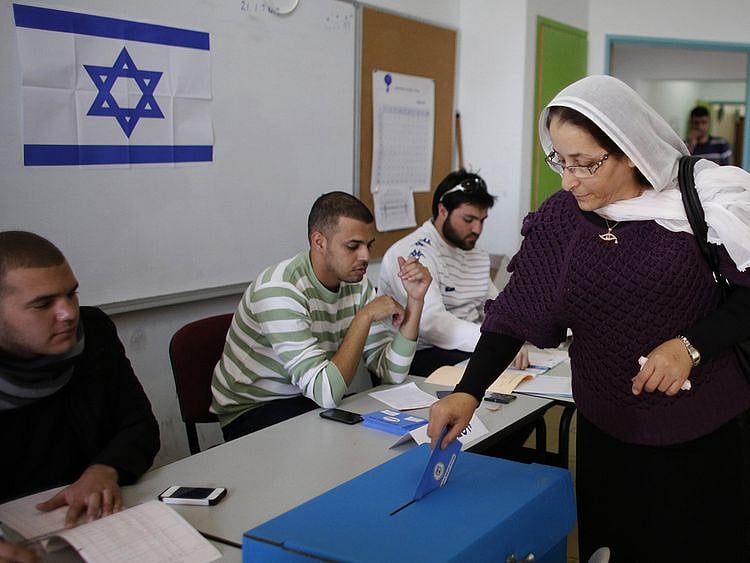Israeli Arabs’ slow and steady integration into society
After historic Knesset gains, Israeli Arabs emerge a key player in Israeli politics

Cairo: They have various appellations. They are called Palestinians of the 1948 areas, Israeli Arabs, the ‘Arabs of the inside’ and the Arab minority. Whatever the nomenclature, they are the descendants of the Palestinians who remained on their land inside the so-called Green Line or the 1949 Armistice border demarcated after the 1948 Arab-Israeli war.
Under Israel’s Citizenship Law, enacted in July 1952, every person who was living inside the Green Line border until that date is eligible for Israeli nationality.
Sixty-eight years after the legislation was adopted, the Israeli Arab population stand at 1.9 million, accounting for around 21 per cent of Israel’s total population of 9 million, according to official statistics.
Muslims make up 83 per cent of the Israeli Arabs with Christians and the Druze accounting for 12 per cent and 5 per cent respectively. They have the right to vote and get Israeli passports.
Over the years, Israeli Arabs have slowly integrated into Israeli society in terms of education and employment. A sizable number of them have obtained university degrees. According to 2010 statistics, university graduates accounted for 63 per cent of the Israeli Arab Christians, against 58 per cent among the Jews and 46 per cent among Muslims.
The 1993 Oslo peace accord, which marked the Palestinians’ recognition of Israel for the first time, provided an impetus to the Israeli Arabs’ integration into Israeli society, according to Amr Al Khayat, a lecturer at Cairo University’s political science school. “This agreement is believed to have provided strong support for the [Israeli] Arabs calling for adaptation to realities and integration into Israeli society,” he added.
In 2006, the Israeli government designated the Arab Israeli areas as qualifying for development and investment.
Politically, Israeli Arabs gradually carved a niche for themselves, becoming recently an influential voice in the Israeli politics. Seventy-seven Israeli Arabs have been members of the Knesset or the Israeli parliament since its creation in 1949.
”Those deputies displayed varying stances in handling rights of Arabs living in the occupied lands after they [those lawmakers] obtained citizenship rights. The Knesset has repeatedly witnessed angry outbursts from them,” Al Khayat added.
In Israel’s recent parliamentary elections held in March, Israeli Arabs made history by winning a total of 17 seats in the 120-strong Knesset, making them the country’s third largest power in the Israeli parliament. They included 15 from Arab parties and two who ran on Jewish parties’ tickets. The gains were so unprecedented that the Israeli newspaper Haaretz called it an “earthquake”.
The Israeli Arab parties vied in the March election, Israel’s third in less than a year, under the umbrella of the Joint List bloc, led by Ayman Odeh. The grouping, comprising four Arab parties, set up the alliance with the aim of having a stronger voice inside the Knesset. The Joint List garnered 13 seats in the inconclusive elections held in September last year.
One of the Israeli Arab winners in the March polls is Eman Yassin, the first veiled Muslim woman to become a member of the Knesset.
A record 65 per cent of the eligible Israeli Arab voters cast their ballots in March, an unprecedented turnout attributed to a mobilisation campaign launched by Israeli Arab politicians. Their turnout in the September election was above 60 per cent, signalling their keenness to have a strong voice in the Israeli politics and counter Israeli far-rightists.
Seventy-six per cent of the Arab constituency would like their representatives to join a government coalition to influence decision-making, according to a survey by the Guttman Centre for Public Opinion and Policy Research at the Jerusalem-based Israel Democracy Institute.
The Israeli Arabs have never been part of a governing coalition in Israel’s history. “We have started a new phase in our struggle inside the Knesset for our rights as a community of the Palestinian Arabs,” Odeh said after the election gains.
“We pledge devotion to our general national causes and other causes such as fighting violence and crime as well as legalising threatened houses. Our greatest dream is to end Israeli occupation and achieve fair peace,” he added in September last year.
Odeh is a vociferous critic of Israeli Prime Minister Benjamin Netanyahu’s policies and a controversial peace plan that US President Donald Trump unveiled earlier this year.
However, Odeh has repeatedly called for reviving long-stalled peace negotiations between Israel and the Palestinians.
Sign up for the Daily Briefing
Get the latest news and updates straight to your inbox
Network Links
GN StoreDownload our app
© Al Nisr Publishing LLC 2026. All rights reserved.